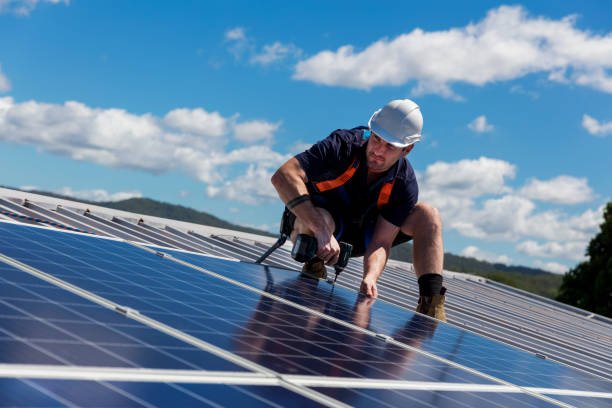In a world of rising energy costs and growing concern about climate change, solar panels have gone from being a luxury to a smart, sustainable investment. Whether you’re looking to save money, reduce your carbon footprint, or gain energy independence, solar is more than just a trend — it’s the future.
In this guide, we’ll break down everything you need to know about solar panels, without the hype or tech jargon.
🔋 What Are Solar Panels & How Do They Work?
Solar panels (also called photovoltaic panels) convert sunlight into electricity using solar cells made from silicon. When sunlight hits these cells, it generates a flow of electricity — powering your home, appliances, or even your electric car 🚗.
It’s like turning your rooftop into a mini power plant — clean, quiet, and renewable.
🏠 Top Reasons to Go Solar
Here’s why homeowners across the U.S. are making the switch:
💸 1. Cut Your Electricity Bills
Solar panels can reduce or even eliminate your electric bill. In many states, your energy savings add up to $15,000–$40,000 over 20 years.
🌍 2. Help the Environment
No carbon emissions. No pollution. One rooftop at a time, solar helps fight climate change and reduce fossil fuel use.
🏡 3. Increase Property Value
Homes with solar sell faster and for more. Buyers love energy savings — and appraisers are starting to value solar features higher.
🔌 4. Protection from Rising Utility Rates
Electricity costs are going up every year. With solar, you lock in lower energy costs for decades.
⚡ 5. Backup Power (with Battery Storage)
Add a solar battery, and you can keep your lights on during blackouts or grid outages.
📊 How Much Do Solar Panels Cost?
The cost of solar panels has dropped over 70% in the last decade, making it more affordable than ever.
Here’s a rough breakdown:
-
🏠 Average home system: $15,000 – $25,000
-
💰 Federal tax credit (ITC): 30% off your system cost
-
🏦 Monthly financing: Often lower than your current electric bill
Tip: Many companies offer $0-down financing, so you can install solar with no upfront cost.
🛠️ What’s Included in a Solar Panel System?
A typical residential solar setup includes:
-
☀️ Solar panels (on your roof or ground-mounted)
-
⚡ Inverter (converts solar energy into usable electricity)
-
🔋 Battery (optional, for storage)
-
🧠 Monitoring system (track your energy production)
-
🛠️ Racking/mounting equipment
The whole system is usually installed in 1–3 days, depending on your home’s layout.
🧭 Is Your Home a Good Fit for Solar?
You don’t need to live in the desert for solar to work. Here’s what helps:
-
🏠 A sunny roof (south-facing is best)
-
🌳 Minimal shade from trees or buildings
-
🧾 High electric bills ($100+/month = more savings)
-
🗺️ Solar-friendly state (with tax credits, rebates, or net metering)
If your roof isn’t a great fit, ground-mounted systems or community solar programs might still be an option.
📍 Best States for Solar in the U.S.
Some states offer more incentives and better savings than others. Top states include:
-
☀️ California
-
🌵 Arizona
-
🐎 Texas
-
🍑 Georgia
-
🌽 Illinois
-
🐢 Florida
-
🍎 New York
-
🍁 Massachusetts
Even in colder states, solar still works — panels need light, not heat.
💵 Solar Incentives & Rebates You Should Know
Installing solar can qualify you for:
-
🎁 Federal tax credit (ITC): 30% off system cost
-
🏛️ State & local rebates
-
🔁 Net metering (sell extra power back to the grid)
-
🏦 Solar Renewable Energy Credits (SRECs) in some areas
These incentives can reduce your total cost by thousands.
⚖️ Should You Buy, Lease, or Finance?
There are three main ways to go solar:
✅ Buy (cash or loan)
-
You own the system
-
Get all tax benefits & long-term savings
💳 Lease or PPA
-
Pay little or nothing upfront
-
Savings are smaller, and you don’t own the system
🏦 Finance
-
Low monthly payments
-
Still get tax credits and ownership benefits
Most homeowners today go with solar loans — affordable, flexible, and lower than their electric bill.

🛡️ Is Solar Really Worth It?
In short: YES — if you plan to stay in your home for at least 5–7 years.
-
You start saving from month one
-
Break-even point is usually within 6–10 years
-
Panels last 25–30 years (many with 25-year warranties)
-
Minimal maintenance (just an occasional cleaning)
With rising energy costs, solar pays for itself faster than ever before.
✅ Final Thoughts
Switching to solar isn’t just good for the environment — it’s a smart, long-term investment in your home and your future. Whether you’re doing it for savings, sustainability, or energy independence, solar gives you real control over your power.
At SmartQuoteDeals.com, we help homeowners make informed energy choices — without pressure or confusion. Curious what solar could do for you?
☀️ Start today — get a free quote and see how much you could save with solar panels on your home.
